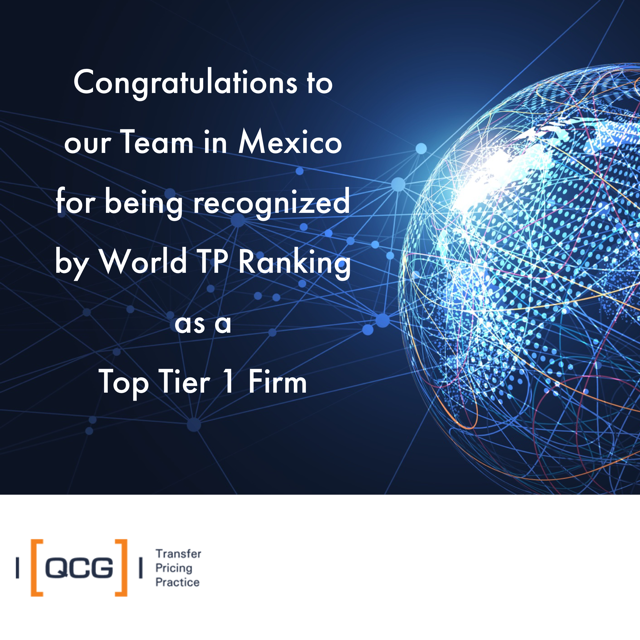8th transfer pricing forum of the Mexican Federation of Economists
Highlights
On September 27, on the 51st floor of Torre Mayor in Mexico City, the 8th transfer pricing forum of the Mexican Federation of Economists took place. The forum was sponsored by Thomson Reuters and brought together distinguished professionals from both Mexico and abroad. The highlights were the following:
OECD transfer pricing perspective. The head of the OECD transfer pricing unit, Tomas Balco, kindly connected in teleconference from Yangzhou China to tell us about the status of the regime and its upcoming changes. During his participation, we were informed that the OECD is working on action 7 (attribution of profits to permanent establishments and their interrelation with the transfer pricing regime), actions 8-10 of the BEPS plan (alignment of transfer pricing with value creation) regarding the guidance on the use of the transactional profit split method, the methodology to analyze hard to value intangibles, the transfer pricing treatment of intragroup services, and the update to chapter IV (administrative approaches). He also informed us about the current work of BEPS action 4 (limiting base erosion involving interest deductions and other financial payments).
The forum also discussed the OECD´s position regarding the US Tax Cuts and Job Acts (TCJA), and also Brazil’s intention to adhere to the OECD transfer pricing guidelines, and the progress of negotiations in this matter. Finally, questions from the public regarding the use of safe harbor for low value-added services, use of geographic market adjustments, the coexistence of advertising expenses and payment of royalties in the light of the new regulatory framework for intangibles, were resolved.
US Tax Reform impact in Mexico. During this panel, Marisol Oregel and Edgar López Lena from RSM spoke about the transfer pricing aspects of the US Tax Cuts and Jobs Act (TCJA) and the new rules on regards of the reduction of tax rates for corporations, the Global Intangible Low Taxed Income (GILTI), the Foreign Derived Intangible Income (FDII), and finally about the Base Erosion and Anti Abuse Tax (BEAT).
Intragroup services, economic and regulatory aspects. During this panel, Jesús Aldrin Rojas the leading partner of our firm, together with David Barrón from Lawbiz Consulting and Marco Elizalde from KPMG, talked to us about the economic behavior of the services in the world, their impact on intragroup trade, and the evolution of regulatory tendencies. They ended by informing us on the status of the review that the OECD is making to Chapter VII of its transfer pricing guidelines (intra-group services).
Legal trends in Mexico. In this panel, Mario Barrera from Thomson Knight and Alejandro Calderón, from Calderón González y Asociados, discussed the status of transfer pricing audits, as well as proposals of alternative dispute resolution mechanisms. The panel also analyzed the recent developments concerning the OECD’s MLI, the new anti-avoidance rules for losses sustained from related party transactions; and new Mexican case law on rules governing the Tax Authority’s powers to issue regulations concerning the local file, the master file, and the country-by-country report.
Intangibles, its DEMPE analysis and the use of the profit split method. During this panel, Óscar Campero from Chévez and Argel Romero from BDO analyzed the new regulatory framework on intangibles proposed by the OECD, the meaning of legal ownership, the impact of DEMPE functions (development, enhancement, maintenance, protection, exploitation), and the concept of economic owner. Additionally, they explore the use of the profit split method as the best alternative to evaluate this kind of transactions.
Transfer pricing and state aid, the unintended consequences of advance pricing agreements. Our keynote speaker Dr. Lorraine Eden, analyzed the recent cases where APA´s granted by the European Union where considered an illegal state aid by the European Union itself, breaching its competition laws, and considering this mechanism as discretionary. Dr. Eden gave her policy recommendations to reduce the negative effect of these administrative mechanisms.
Status of Maquiladora APA´s / Perspective of the Mexican Tax Authorities. Ricardo Cruz of EY, Oscar Mata of Lear Corporation, and Alejandro Zubarán of the SAT informed us about the status of the maquila regime in Mexico, the advances of the fast track methodology, and the expectations of the regime in the country. During the second stage of this conversation, José Luis Velasco Verdugo and David Ruiz Enriquez from the SAT joined the conversation to talk about the current auditing developments, the use of aggressive schemes by taxpayers, and the use of risk models by the tax authorities.
The event was a success, and it fulfilled its objective of informing taxpayers about the status of the transfer pricing regime at present. The material of the presentation can be downloaded from the Convene application (in Apple or google store), courtesy of Thomson Reuters, sponsor of the 8th transfer pricing forum. We appreciate your participation and we hope you can accompany us in future events of the Federation of Economists, of which our firm is an active contributor.
We are at your service should you require assistance in any of the mentioned topics.


